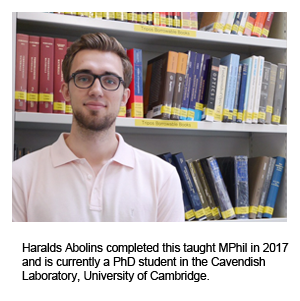 "Even though I'll be starting a research-based PhD after this course, the business components of this MPhil have made me seriously consider entrepreneurship as an alternative, or even better - an addition to a career in academia."
"Even though I'll be starting a research-based PhD after this course, the business components of this MPhil have made me seriously consider entrepreneurship as an alternative, or even better - an addition to a career in academia."
Overview & Expectations
The programme is intended for those with a good first degree in the physical sciences and engineering who wish to develop research skills and a commercial awareness in micro- and nanotechnology. It combines cutting-edge science with business practice skills giving students knowledge and experience of a range of disciplines. This should enable students graduating from the course to evaluate the scientific importance and technological potential of new developments in the field of micro- and nanotechnology and provides an unparalleled educational experience for entrepreneurs in these fields.
The programme is modular in structure and lasts ten months. It is envisaged that all students attend all modules, which consist of no more than 16 hours of lectures per module with additional discussion groups and personal study time. The students will be examined on all core modules and may select which elective modules they are examined on. The modules are taught in the first two terms and are followed by formal examinations. The modules are drawn from Science and Technology, Business Management and Innovation strands and so cover the many complexities involved in the processes of discovery and exploitation.
The majority of the final term is devoted to a research project lasting approximately ten weeks. A large number of project topics are proposed each year by staff in Cambridge and by colleagues in industry. During the first term, students choose one of these topics or may design their own project in collaboration with a member of staff. All projects are individually supervised. After the examinations, students work exclusively on their projects until mid-July when they submit a dissertation. An oral examination will be held at the end of July (or early August, under exceptional circumstances).
This page is for external visitors and gives general information on the lectures and course activities which are available during the 2023-24 academic year. Please be aware that the lectures and activities offered can change from one year to the next, as may the lecturers who deliver them. A summary of the 2023-24 courses is found below. Full synopses and a list of lecturers for any given year can be found within the relevant Course Handbook which is provided to students upon commencing the course.
- NE.01: Characterisation Techniques
- NE.02: MEMS Design
- NE.04: Nanofabrication Techniques
- NE.05: Nanomaterials
- NE.06: Nanochemistry
- NE.07: Physics at the Nanometre-Scale
- NE.08: Bionanotechnology
- NE.09: Nanoelectrochemistry
- NE.10: Energy Harvesting
- NE.11: Nano Self-assembly
- Science, Communication, Responsibility, and Ethics (SCoRE)
- NMIS: Nurturing and Managing Innovation in Science
Requirements
Applicants for this course should have achieved a good UK II.i Honours Degree.
If your degree is not from the UK, please check International Qualifications to find the equivalent in your country.
Applications
Admission of postgraduate students for this MPhil degree is co-ordinated by the University’s Postgraduate Admissions Office. Applications may be made online (for which a charge is payable). The deadline for applications is usually three months before the start of the first term of the course (e.g. towards the end of the preceding June). See the course detail and application link on the Postgraduate Study website: https://www.postgraduate.study.cam.ac.uk/courses/directory/pcmmmpmne.
Further details of the application procedure, and the Postgraduate Studies Prospectus, are available from the Postgraduate Admissions website.
Other
Links to the Moodle site for currently registered students can be found in here.
CamGuides - a free online resource for all Master's students with a taught element, designed as an introduction to some of the academic, digital and research practices that they will engage in at the University of Cambridge. It encourages students to think about ways they can prepare for their Master’s degree before it starts.
